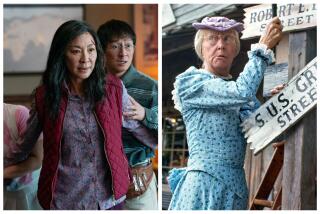Maturity Is in the Eye of the Computer
- Share via
I got a letter from an automobile insurance company the other day soliciting my business as a potential Mature Customer. Wow.
Insurance companies tend to look at older drivers in one of two ways: Either our scope of operations is between home and the supermarket, so we can’t get into too much trouble and are therefore a good risk, or else our judgment and our responses are so addled that we’re likely to go around banging into other cars willy-nilly.
We’re in the first category until we have an accident. Any accident. Their computers don’t care about extenuating circumstances. We have an accident, and we’re in Category 2, no matter how many years we’ve paid outrageous fees for insurance we never used.
But that really isn’t what upset me about this letter. What upset me was being called a Mature Customer. On two counts.
First of all, the next commercial enterprise that comes up with a marshmallow substitute for “old” is going to push me over some edge or other. The American facility for softening or disguising simple Anglo-Saxon words seems limitless.
Second, how in hell do they know whether I’m “mature”? I know a few mature teen-agers and a dismaying number of immature older adults. So I resent being so glibly classified.
The insurance company is probably just following the lead of the American Assn. of Retired Person’s magazine, which is called Modern Maturity. Seems to me that could apply to people of any age.
According to Webster’s 9th Collegiate Dictionary, the first definition of mature is: “based on slow, careful consideration, a mature judgment.” Now I’d like to think I qualify under that definition, but they don’t know that. They’re simply equating advanced age with maturity, and there is often very little connection.
This is just another example of how much of our time we spend in avoiding straight talk in this society. The examples are all around us.
Foreign visitors must be perplexed when they are directed to a “restroom.” In every other nation in the world, it is called simply--and accurately--a toilet. Fat Americans are known as heavyset or pleasantly plump or somewhat obese. When we lose something, we mislay it. At the university where I teach, students are allowed to take some classes Pass/Not Pass--instead of simply Pass/Fail. The CIA doesn’t murder people, it terminates them. And on and on.
But nowhere are such obfuscating labels more endemic than in the extremities of our society: the old and the very young. The schools go to quite remarkable creative lengths to classify children in such a way that the parents won’t be offended.
The kids don’t care. Soft labels are learned behavior. Kids can deal with Anglo-Saxon concepts until they grow up and learn about public relations. But the parents have to be mollified with nomenclature--gifted, exceptional--that is fuzzy enough to avoid social stigma.
Same way with older people. If old is seen chronologically, it’s a perfectly responsible label. But if old is seen as senile, it’s inaccurate. Senility is a disease that afflicts some elderly people and completely bypasses others--just as maturity may or may not be associated with older people. Or wisdom. Or rigidity in thinking.
We’ve been floundering around ever since my father grew old for terminology to soften advanced age. I suppose “senior citizen” is as good as anything else, but that doesn’t stop me from disliking it. As, I guess, I dislike any generic labels. If we’re talking about people over 55 or 60 or 65, why don’t we just say so?
Older people, like kids, are quite capable of dealing with straight talk. It’s just the generations in between that seem to be threatened.
More to Read
Inside the business of entertainment
The Wide Shot brings you news, analysis and insights on everything from streaming wars to production — and what it all means for the future.
You may occasionally receive promotional content from the Los Angeles Times.










